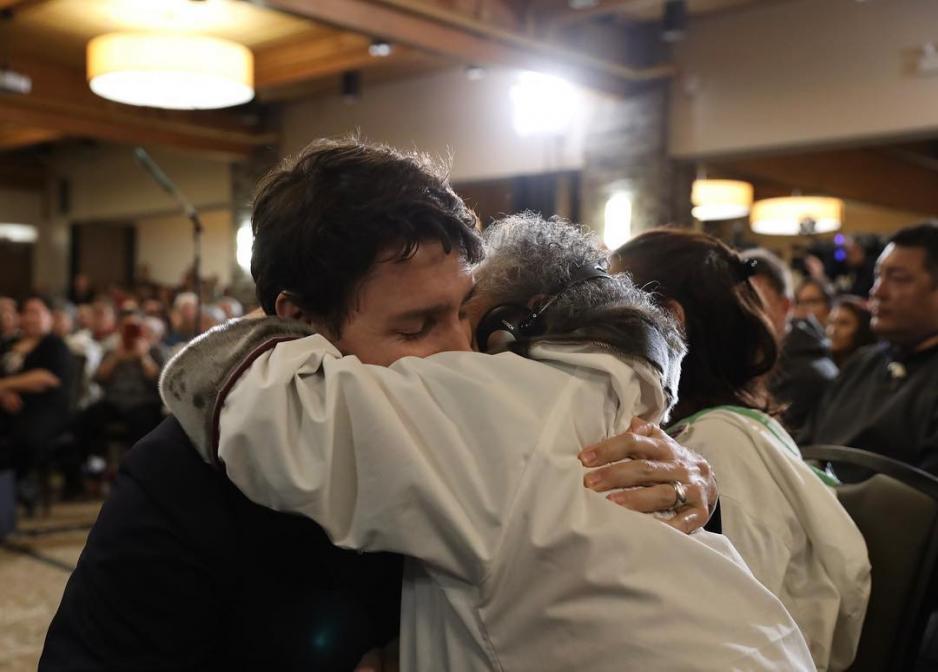Canadian Prime Minister Justin Trudeau apologized "Canada must carry that guilt and that shame"

Prime Minister Trudeau embraces an attendee (Photo credit: Justin Trudeau)
After being delayed due to snowstorm, Canadian Prime Minister Justin Trudeau delivered an apology to Inuit mistreated during TB epidemics of the 1940s, 50s, and 60s.
After his plane was diverted due to a blizzard that engulfed Iqaluit last night, Canadian Prime Minister Justin Trudeau landed early this morning in the capital of Nunavut.
Leaving behind the SNC-Lavalin scandal that has engulfed Ottawa, the Prime Minister is in the capital to deliver an apology for the mistreatment of Inuit who were sent to Southern Canada to receive treatment for tuberculosis—many of whom never returned home—during the epidemics of the 1940s, 50s, and 60s.
Canada must carry that guilt and that shame
Before an audience from across the four Inuit regions of Canada, the Prime Minister began by acknowledging the multiple levels of injustice and mistreatment faced by Inuit communities during the mid-20th century.
These included the identification of Inuit by numbers on leather tags, the government ordered slaughter of dog sled teams, the forced relocation of some Inuit communities to support Canadian claims to sovereignty in the High Arctic, and the separation of children from their families as part of the residential school system.
Trudeau acknowledged that federal policies towards the Inuit, including the way those suffering from tuberculosis were treated, were “purposeful” and “colonial” and noted that the government understood it was taking a toll.
"Canada must carry that guilt and that shame," said Trudeau, highlighting the longstanding mistreatment of Inuit communities by the federal government.
"We are sorry for forcing you from your families, for not showing you the respect and care you deserved. We are sorry for your pain. The racism and discrimination that Inuit faced, was, and always will be, unacceptable."
This apology is a necessary first step toward closing this dark chapter in Canada’s history and remedying the ongoing challenges that are connected to it
A history of mistreatment
During the mid-20th century, the federal government began to force previously nomadic Inuit to settle permanently, often arguing that this would allow Ottawa to provide better services to northern communities through annual shipments of supplies and medical services.
When tuberculosis epidemics began to appear in northern Canada during the 1940s, anyone who tested positive was quarantined aboard medical ships that came every summer and sent to be treated at sanitoriums spread across southern Canada.
In some cases, it appears that those sent to sanitoriums were experimented on medically and forced to undergo shock therapy.
Often the families of those who died during treatment were not told of their loved ones passing or were not alerted to where the burial sites were.
Nunavut Tunngavik Inc., an organisation that monitors the implementation of the Nunavut Agreement and runs the Taima TB (Stop TB) campaign, estimates that there are approximately 700-800 Inuit buried in southern Canada in graves that remain unknown to their loved ones to this day.
Nanilavut Initiative to help families find loved ones
Alongside the apology, the government announced the launch of the Nanilavut Initiative.
Meaning “let’s find them” in Inuktituk, the project is designed to help families find the graves of loved ones who were buried in southern Canada.
It will also provide mental health and commemoration services.
Mixed reactions
Natan Obed, the president of Inuit Tapiriit Kanatami, noted that this long-overdue apology was a positive step moving forward.
“This apology is a necessary first step toward closing this dark chapter in Canada’s history and remedying the ongoing challenges that are connected to it.”
Others, however, felt that the government had not gone far enough.
The Dene people and the Inuit people have all gone through so much and so many types of trauma and abuse
Speaking to CBC news, Marie Speakman says it feels like a “slap in the face” that the Prime Minister is only apologizing to the Inuit while other Indigenous groups, such as the Dene, suffered the same things.
"The Dene people and the Inuit people have all gone through so much and so many types of trauma and abuse from residential school, to day school, to the Indian hospitals where they sent people with TB."
Tuberculosis still a problem
Across northern Canada, incidences of tuberculosis occur at much higher rates than in the southern provinces. In Nunavut, a report by the Ministry of Health notes that rates of the disease are 290 times higher than the Canadian average.
The report also emphasizes that the housing crisis wracking many northern communities is in large part to blame. Due to a lack of options, many find themselves living in overcrowded social housing which allows tuberculosis—an airborne disease—to be rapidly transmitted.
In 2018 it was estimated that 10% of people in the 600-person community of Qikiqtarjuaq, Nunavut, had active tuberculosis—the highest rate in the territory.
